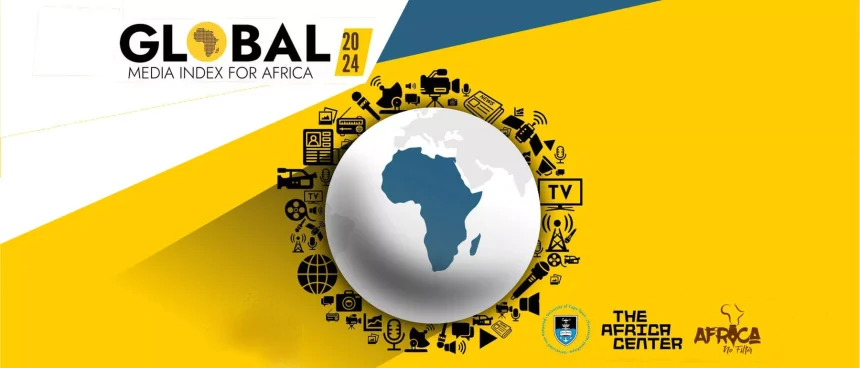Africa No Filter and the Africa Center New York have launched their Global Media Index for Africa (GMI) which tracks how 20 of the world’s most influential news providers cover Africa.
Details
The report, produced by the University of Cape Town, shows that global coverage of Africa prioritizes the voices of powerful men, and often focuses on politics, poverty, corruption, and related negative subjects.
The Global Media Index for Africa assesses and ranked *online news stories of CNN, Deutsche Welle, Russia Today, Bloomberg, Xinhua, Le Monde, The Guardian, Wall Street Journal, Associated Press, Al Jazeera, The Economist, New York Times, VOA News, AFP, Reuters, BBC, CGTN, Financial Times, RFI, and The Washington Post.
Details
More than 1,000 news articles were collected over a six-month period, and evaluated across four key indicators.
The indicators used to assess content include the diversity of topics covered, sources interviewed and quoted, the number of African countries covered, and the depth of coverage including balance, context, and stereotype avoidance.
Results
The Guardian was in first place on the index for its overall coverage of the continent, with a score of 63%, while the Washington Post ranked lowest at position 20 with a score of 47%.
The general performance across the online news content from all 20 media outlets falls within the category of ‘medium’, suggesting that coverage of Africa in terms of new, more progressive narratives leaves room for improvement.
On the positive side, most media organisations scored high on the ‘depth of coverage’ indicator which assessed balance, context, stereotypes, and framing; proving that the most well-funded media organisations in the world, who make up this index, are aware of the tenets of a good news story.
What They’re Saying
Professor Wallace Chuma, lead researcher for the Global Media Index for Africa, said: “Our research provides not just a snapshot of current media practices, but a call to action for global media to critically examine their storytelling about Africa and understand its impact. The index serves as a baseline from which we can push for more nuanced and equitable media narratives. This study marks an important step towards challenging the status quo and enriching global understanding of Africa.”
Dr. Uzodinma Iweala, CEO of The Africa Center, said: “Media narratives shape the perspectives that determine how global decision makers engage with Africa. Media coverage of Africa has become more balanced, over the years, largely due to the advent of social media that offers first-person counter-narratives to biases in journalism based on antiquated beliefs.
The GMI shows that there is room for more voices, more experiences, and more coverage that reflect the shifts happening across the continent, which will encourage greater opportunities for African people, and ultimately, for the world.”
Moky Makura, executive director at Africa No Filter, said: “The Global Media index is a bold move, but we can’t ignore the outsize influence these global media outlets have on how the world sees Africa and how Africa sees itself. It’s in our interests as concerned Africans to track and monitor what and how they write about us. But it’s important that we see the Index as a carrot, rather than a stick – we are highlighting what is working and showing what is possible when it comes to reporting on Africa. “
By The Numbers
The Global Media Index for Africa also found that:
- The Guardian is also number one for the diversity of topics covered, with a score of 57%. At second and third places overall on the index are AFP and Reuters agencies, with scores of 61% and 60%, respectively.
- AFP also came in first place for covering the most African countries of the outlets assessed, with a score of 56%.
- Three leading American powerhouse media organisations came in at the bottom of the index at 18th, 19th, and 20th positions. They were the New York Times (51%), Wall Street Journal (48%), and The Washington Post (47%).
- Wall Street Journal came in at the bottom of the index in the 20th position for the limited number of countries it reported on, with a score of 31%.
- The Washington Post, with a score of 29%, ranked lowest for the ‘diversity of topics’ covered, representing a continuity of previous patterns found in many media of framing Africa through the lens of its stereotypes.
- The Guardian is in first place with a score of 62% for the range of diverse voices in its articles. Russia Today ranked at number 20 with a score of 36%.
- For the ‘depth of coverage’ on their stories, overall, all 20 outlets generally performed well across the four sub-indicators of balance, context, framing, and avoidance of stereotypes.
Between The Lines
Without exception, the global media organisations in this study devoted disproportionate space to powerful men — from politicians and businesspeople to experts — as primary news sources in their stories about Africa, showing that men still dominate the news in and about Africa.
Most of the global media in the index only covered a handful of African countries in depth in their reports, showing that global media still largely treats Africa as a country.
There were no high performers in the ‘diversity of topics’ reported on, with the lion’s share of news about Africa being about politics, poverty, corruption, and related negative subjects.
There was scant attention to topics such as culture, the arts, innovation, technology, and other positive developments in the continent found in the online stories.
Source: Africa No Filter
Catch up on news and other tidbits on our WhatsApp Community Page, Twitter/X, and subscribe to our weekly newsletter to ensure you don’t miss out on any news.
Catch up on news and other tidbits on our WhatsApp Community Page, Twitter/X, and subscribe to our weekly newsletter to ensure you don’t miss out on any news.










